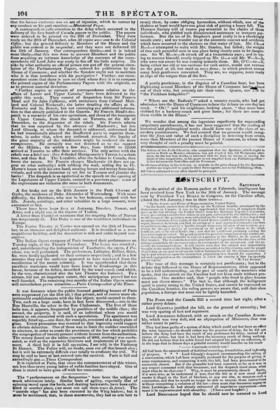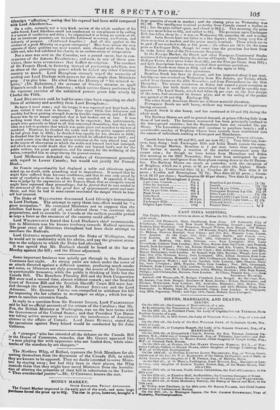The Peers read the Canada Bill a second time last
night, after a rather prosy debate.
Lord GLENELG justified the bill, on the ground of necessity; but was very sparing of fact and argument, Lord ABERDEEN followed, with an attack on the Canadian Assem- bly, which was very dull, and an objurgation of Ministers, that was rather smart in parts—
They had been guilty of a system of delay which could not but have an effect the most injurious--he should rather say the practice of delay, for he did not believe the delay had been the result of any preference for delay, instead of a course of action, but that it bad been the necessary result of doing nothing. He did not believe that his noble friend haul adopted his policy on reflection, or in the hope that in future days a grateful country would inscribe on his tomb
Cunetando restituit rem."
All had been the natural result of habitual wavering, irresolution, and infirmity of purpose. * * • Lord Glenelg's despatch recommending the calling of a convocation, which had been originally produced fur the purpose of giving it some countenance, and connecting it with this bill, had been pronounced to be eminently absurd. But if the preamble had been removed, so far as it was in any respect connected with that document, and the despatch stood alone, what must then be its character ? Why, it must be preeminently absurd. Again, if it were true, as he understood it was, that the bill as it now stood would render it illegal in the Earl of Durham, or any one else, to summon such a convention, and that he would no longer be able to execute those instructions without committing a violation of the law—then must that document appear*, their Lordships—he had already, exhausted all superlative expressions--then must it be supersaturated with absurdity. (Cheers and laughter.) Lord BROUGHAM hoped that he should now be restored to Lord
(IleneIg's "affection," seeing drat his reproof had been mild compared with Lord Aberdeen's-
On a calm, certainly, not a very kind, review of the whole conduct of his noble friend, Lord Aberdeen could not condescend to compliment it by calling it a system of vacillation and delay ; he stigmatized it as being no system at all, but an inveterate practice-an incurable habit-of wavering. vacillation, and infirmity of purpose. (Continued laughter.) And all ibis applied to the conduct of a great Ministry OD a great emergency ! Alen from whom the very opposite of those qualities was must wanted, were charged with them by the noble earl, who had exhibited his charity in an endless strain of vitupelation.
Not a man was sent to the Calvados, nor a pound spent, but in con- sequence of the famous Resolutiens ; and eons in one of those pro- vinces, there were occurrences filet baffled description. The conduct of Sir Francis Head, in fostering instead of preventing rebellion, was an abuse of the governing power which he defied any other Christian country to match. Lord Brougham strongly urged the necessity of sending out Lord Durham with powers far more ample than Ministers prop. ii to give him. He cited from the History of " his revered re- lative," (Dr. Robertson,) the account of Grisca's mission to quell Fiasco's revolt in South America ; which service Gases performed by the vigorous exercise of the unlimited powers given him wisely by Charles the Fifth.
Lord MELBOURNE said, he had for some time been expecting an ebul- lition of acrimony and acerbity from Lord Brougham- lie knew it must come; and the longer it was repressed and kept back, the more violent it was sure to become. Ever since 1833, that bitterness and acerbity had been gaining strength from its forcible suppression, and Lord Mel- bourne was by no means surprised that it had broken out at last. It was nothing more than what was naturally to be expected ; but, unfortunately, people were generally so blind to all that concerned themselves, that they were often at a loss to perceive that which was quite plain acid manifest to the rest of mankind. However, he thanked the noble lord for the active support which Ile had given him in 1635; lie thanked him equally for his absence in 1836; he thanked him for the less active support which he afforded him in 1837; and be could assure him that he now felt no irritation at the vety altered tone and at the course of observation in which the noble and teat ned lord had indulged, and which no one could doubt that the noble and learned lord's zeal for the public welfare, his great patriotism, and his anxiety for the wellbeing of the nation, compelled him to adopt during the present session.
Lord Melbourne defended the conduct of Government generally with regard to Lower Canada ; but would not justify Sir Francis Head- Sir Francis unquestionably had displayed a noble and chivalrous spirit, mixed up, no doubt, with something near to imprudence. It seemed that he might have suffered from his over-confidence, and that lie was only saved by want of resolution in those by whom he was assailed. It appeared, if they were to judge by the expressions of Sir Francis Head, that an energetic course might have repressed these proceedings but he feared that he was misled in his statement of the case by his great love of epigranamatic point and anti- thesis, and that he had to some extent overstated the danger which he him-
self had incurred. .
The Duke of WELLINGTON denounced Lord Glenelg's instructions to Lord Durham. The attempt to carry them into effect would be "a gross usurpation." He entreated Ministers not to suppose that the rebellion had been got rid of; and advised them "to continue their preparations, and to assemble in Canada at the earliest possible period u large a force as the resources of the country could afford."
Lord WHARNCLIFFE feared that Lord Durham's chief recommenda- tion to Ministers was his known tendency towards Radical opinions. The great error of Ministers throughout had been their attempt to conciliate the Radicals.
Lord GLENELG respectfully assured the Duke of Wellington, that be would act in conformity with his advice, and pay the greatest atten. lion to the subjects to which the Duke had adverted.
It was agreed that Mr. Roebuck should be heard at the bar on Monday against.the bill ; and the House adjourned.



























 Previous page
Previous page